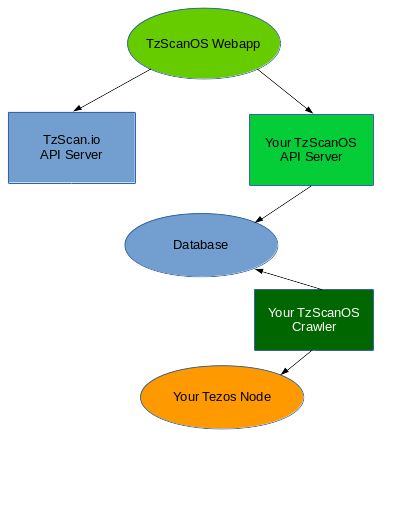First Open-Source Release of TzScan
In October 2017, after the Tezos ICO, OCamlPro started to work on a block explorer for Tezos. For us, it was the most important software that we could contribute to the community, after the node itself, of course. We used it internally to monitor the Tezos alphanet, until its official public release in February 2018, as TzScan. One of TzScan main goals was to make the complex DPOS consensus algorithm of Tezos easier to understand, to follow, especially for bakers who will contribute to it. Since its creation, we have been improving it every day, rushing for the Betanet in June 2018, and still now, monitoring all the Tezos networks, Mainnet, Alphanet and Zeronet.
So we are pleased today to announce the first release of TzScan OS, the open-source version of TzScan!
-
The sources are available on Gitlab: https://gitlab.com/tzscan/tzscan
-
The code, mostly OCaml, is distributed under GNU GPL v3.
The project contains:

-
The blockchain crawler, used to monitor the blockchain, and fill a PostgreSQL database
-
The web interface, requesting information using a REST API
-
The API server, using the PostgreSQL database to reply to API requests
It can be used in two different modes:
-
Remote Use: if you are not running a Tezos node, you might want to only run the web interface, using the official TzScan API server
-
Local Use: if you are running a Tezos node, you can use the crawler and the API server to serve information on your node, to a locally running web interface
Contribute
If you are interested in contributing to TzScan OS, a first step could be to translate TzScan in your language : check the file lang-en.json for a list of strings to translate, and lang-fr.json for a partial translation!
OCamlPro’s services around TzScan
TzScan OS can be used to monitor private/enterprise deployments of Tezos. OCamlPro is available to help and support such deployments.
Acknowledgments
We are thankful to the Tezos Foundation and Ryan Jesperson for their support!
All feedback is welcome!
About OCamlPro:
OCamlPro is a R&D lab founded in 2011, with the mission to help industrial users benefit from experts with a state-of-the-art knowledge of programming languages theory and practice.
- We provide audit, support, custom developer tools and training for both the most modern languages, such as Rust, Wasm and OCaml, and for legacy languages, such as COBOL or even home-made domain-specific languages;
- We design, create and implement software with great added-value for our clients. High complexity is not a problem for our PhD-level experts. For example, we helped the French Income Tax Administration re-adapt and improve their internally kept M language, we designed a DSL to model and express revenue streams in the Cinema Industry, codename Niagara, and we also developed the prototype of the Tezos proof-of-stake blockchain from 2014 to 2018.
- We have a long history of creating open-source projects, such as the Opam package manager, the LearnOCaml web platform, and contributing to other ones, such as the Flambda optimizing compiler, or the GnuCOBOL compiler.
- We are also experts of Formal Methods, developing tools such as our SMT Solver Alt-Ergo (check our Alt-Ergo Users' Club) and using them to prove safety or security properties of programs.
Please reach out, we'll be delighted to discuss your challenges: contact@ocamlpro.com or book a quick discussion.
Most Recent Articles
2024
- opam 2.2.0 release!
- Flambda2 Ep. 2: Loopifying Tail-Recursive Functions
- Fixing and Optimizing the GnuCOBOL Preprocessor
- OCaml Backtraces on Uncaught Exceptions
- Opam 102: Pinning Packages
- Flambda2 Ep. 1: Foundational Design Decisions
- Behind the Scenes of the OCaml Optimising Compiler Flambda2: Introduction and Roadmap
- Lean 4: When Sound Programs become a Choice
- Opam 101: The First Steps
2023
- Maturing Learn-OCaml to version 1.0: Gateway to the OCaml World
- The latest release of Alt-Ergo version 2.5.1 is out, with improved SMT-LIB and bitvector support!
- 2022 at OCamlPro
- Autofonce, GNU Autotests Revisited
- Sub-single-instruction Peano to machine integer conversion
- Statically guaranteeing security properties on Java bytecode: Paper presentation at VMCAI 23
- Release of ocplib-simplex, version 0.5
- The Growth of the OCaml Distribution
2022